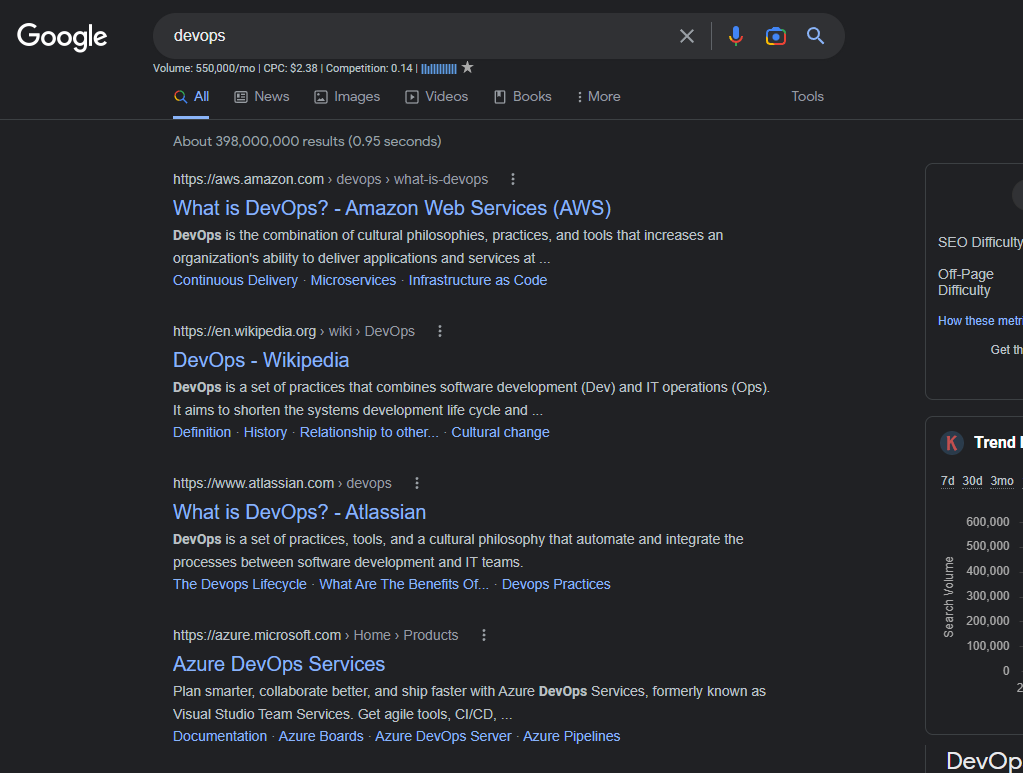Gut Check Time: The “Are You Sure You Want Organic Traffic” Checklist
(Editorial note: I originally wrote this post over on the Hit Subscribe blog. I’ll be cross-posting anything I think this audience might find interesting and also started a SubStack to which I’ll syndicate marketing-related content.)
Today I’m going to dive into a topic and a situation that comes up constantly among clients and prospects. It’s the “You say you want organic traffic, but do you really?” conversation.
Historically, I’ve tended to have this conversation live. But it comes up so often that I’m going to immortalize it here, in written form, and hope that it’s broadly helpful.
The lede here is that only maybe half of the businesses that come to us asking about organic traffic are actually prepared to make it a reality. Thus if you’re reading this, there’s a coin-flip chance that you’ve said you want it but you’re actually going to beg off when the rubber meets the road. It’s probably even more of a coin-flip if someone linked you here.
So let’s walk through a list of questions to ask yourself. You should come away with a sense that, yes, you’re all in, or no, it’s not the distribution channel for you. Either outcome is good since it points you in the direction of what to do next.
Of Course You Want Organic Traffic
I’d like to start out with a brief clarification. Of course you want search engine traffic, in a vacuum. Who wouldn’t?
After all, framed this way, your choice is “Would you like a search engine to deposit people on your site or not?”
Who would say no to that?
Sadly, though, whatever anyone may have told you, that’s the wrong question. Or at least it’s not a refined enough question.
A better version reads as follows.
Are you prepared to turn a decent portion of your site into a somewhat basic form of Q&A, writ large?
Not quite as clear-cut now, is it? I can psychically hear the doubt creeping in:
- But we have original ideas we should talk about!
- Why would we write about something other people have already written about on the internet?
- Our users will think we don’t know what we’re talking about if we cover basic subjects.
If you’re having thoughts like these, you’re going to either need to change your mental model of using your blog and your site or else think of a different content distribution paradigm than search traffic.

The Questions to Ask Yourself Honestly
With that in mind, let me walk through a bit of introspection with an admittedly blunt approach. If you come out the other side, you’re ready.
If not, that’s okay, too. We’ll help you figure out what to do instead.
1. Do You Understand That You Can’t “Do SEO” To Other Types of Content?
Despite what more opportunistic members of the Minutiae Industrial Complex SEO consulting world would have you believe, you don’t use Yoast to “sprinkle some SEO” on existing content and, poof!, traffic.
It doesn’t matter what you do to your H2s and H3s and what your keyword density is. At its core, driving search traffic to your site means figuring out what questions people are asking when they google things and answering those questions. (I cover this in a LOT of detail here, if you’re interested.)
There is thus a straightforward multi-part content ratio for search engine traffic: one keyword, one question, one URL on your site, one answer.
Are you answering the searcher’s question (on a site that isn’t awful to visit)? If so, you will rank. If not, you won’t.
What this means is that you can’t simply take some premise you dreamed up, like “Why DevOps is Like a Bird Hatchling” and “SEO it.” That nonsense I just made up doesn’t answer any question that anyone anywhere in the universe is asking. There is no amount of Yoast or keyword stuffing that will alter that fact and bring search engine traffic to that weird blog post.
Having search engine traffic means creating content specifically designed for that purpose, from soup to nuts.
2. Do You Understand That You Don’t Pick the Premise of Your Posts?
“Okay, okay,” you’re thinking. “No DevOps bird hatchling.”
But you’ll show me! You’ll target the keyword “DevOps” with your bird hatchling premise. You’ll just make sure you say DevOps a LOT in the post and make Yoast turn green for it.
No, you won’t. Er, well, not if you’re paying us to plan and commission content, anyway. You’re obviously free to chase page forty-five of the search results with your site’s content. I’m not running some kind of content strategy autocracy.
You won’t rank with your post about birds. You similarly won’t rank with your hot take about why DevOps is dead or with your predictions for the future of DevOps or anything else at all, other than a blog post with a title very similar to “What is DevOps?”
Don’t believe me? Take a look at the search results at the time of writing.

Not a lot of scintillating thought leadership premises and hot takes in there. Just a bunch of answers to the question that searchers are asking with this keyword: what is DevOps? (And, to a lesser extent, a bit of navigational intent for DevOps providers.)
If you want to rank for DevOps, you have to write a post explaining the basics of DevOps. In general, if you want to rank for any term, the searcher picks the premise—not you.
3. Do You Understand That You Don’t Really Even Pick the Topics?
Believe it or not, I’m actually not done sucking the fun out of topic ideation. Because not only do you not get to pick your premise when targeting a keyword, but you have limited ability to even pick the keyword itself (and thus the topic).
For instance, all this talk about how to rank for DevOps is well and good for Wikipedia, Atlassian, Microsoft, and Amazon, but not for you. You, dear reader, can forget all about this keyword and this topic because until you buy out one of those companies and take over their site, your article will never, ever rank for this term.
It is far, far too difficult.
And “too difficult” isn’t the only way a keyword (and thus topic) will elude you. It may also have no volume, terrible segmentation, fragmented search intent, brand domination, and all sorts of other problems.
On your site, especially in the early going, post ideation won’t involve asking, “What do I want to talk about?” Instead, it will involve deciding vaguely what topics you’d like to see and rejecting 95% of related keywords for reasons that I just mentioned. You then write about the remaining 5% not because they spark joy but because they’re what’s left.
4. Are You Prepared to Create Content That Doesn’t Talk About Your Product?
Here’s another kicker. Once you’ve settled on the topics based on the searcher, segmentation and keyword stats, you’ll most likely wind up answering searchers’ questions that make it somewhat inappropriate to talk about your product.
Take the DevOps keyword as an example. Whatever it is you do, working in a mention of it and a plug for it while answering the question “What is DevOps?” will be awkward at best. And when readers find things awkward, they smash the back button and read something else, which, in turn, causes the search engine to spank your content all the way to page two of the results.
Searchers rarely appreciate pitches and plugs when they’re in research mode, asking questions about what things mean, how to do things, how to fix errors, etc.
There are situations (generally known as commercial or transactional intent) where a searcher is looking to learn more about or even buy your product. But, in a development unlikely to shock you if you think about it, those searches are extremely competitive and hard to rank for.
If you want to drive significant traffic, you need to abandon the idea that content is about pitching. Instead, you have to commit to answering searchers’ questions. Maybe, just maybe, you can mention yourself gently at the end (or drop a pixel).
5. Do You Have an Architecture in Mind for This Content?
If you do not have experience attracting organic traffic, this has likely been a fairly awful read for you up to this point. You can’t talk about the product you’re proud of, you have to create boring Q&A content about whatever dregs are left once you filter out the hard keywords, and any fans and followers are going to look at you sideways for writing a blog post about “What is DevOps?” (if you could rank for it anyway).
Well, I’m pleased to offer something a bit redemptive that might make you feel better.
Some of these concerns might melt away if you position your content in the form of a broader “content architecture.”
Check out the agile coach at Atlassian. Or Digital Ocean’s guest tutorials.
These (savvy organic traffic) plays have both an easily-articulated raison d’etre and a narrative for promoting content in social media and other channels. In other words, when Atlassian published this definition of sprint planning, I doubt they blasted out a tweet of the form “Check out our latest hard-hitting blog post entitled ‘What Is Sprint Planning?'” Instead, it was probably “We added a sprint planning definition to our Agile Coach knowledge base.”
Establishing a narrative and structure for organic content is critical for avoiding a needless coupling of answering questions to editorial concerns. Organic content is Q&A writ large, so having an architecture of tagging and mapping with concepts like “knowledge base” or “[whatever] coach” or “shared tutorial repository” is crucial. It explains why this content exists in a beautifully non-awkward way.
6. Do You Have an Algorithm in Mind for Topic Selection?
One of the most subtle failure patterns with funneling organic-targeting content through an editorial calendar is decision fatigue. We’ve come to refer to this paradigm internally as “topic fishing.”
It basically happens when you approach creating organic content the way you’d approach column- or journal-style blogging. “Gosh, what should we talk about this week?”
Driving organic traffic to your site is a game much like your retirement savings account. Do as much as possible as quickly as possible.
Inefficient topic ideation works heavily against that. And inefficient, serial topic ideation also eventually leads to setting your money on fire in the form of content cannibalization (a topic for another day).
Luckily, having a compelling answer to item five here helps a good bit. For the agile coach, Atlassian’s algorithm for selecting topics was probably “Does it explain a concept in agile?” and a thumbs up or down accordingly. In the early days, Digital Ocean’s algorithm was probably “Is it a web tutorial?”
However you’ve structured the knowledge repository (or not), you need a decision-algorithm for organic content that isn’t “I’ll review each topic and try to picture it on our blog.”
Rather, you should lay this out in a form like “If it’s a tutorial about [X, Y, or Z] we’ll publish it.” Without decision-rules like this, inefficient ideation will trip your organic program as soon as the starting gun fires.
Summary Checklist and Next Steps
For the sake of an actionable conclusion, I’m going to condense this to a checklist to run yourself through. If you truly want significant organic traffic, you need to confidently say “yes” to each item here.
- I understand that I can’t magically bring traffic to topics that strike me as interesting to write about.
- I understand that the searcher question—and nothing else—dictates the title and premise of the content.
- I understand that I need to let keyword segmentation and statistics determine what we write about.
- I understand that I’ll likely talk little, if at all, about our product and brand in this content.
- I have a holistic vision for this content and the architecture of it on our site.
- I have a set of “yes” criteria or, generally, a way that we can automatically approve topics in bulk.
If you ran through all of that and said “yes” with confidence to each, then let’s do it—let’s go get you 6+ figures per month in visitors.
Otherwise, if you said no, that’s okay too. The search engine is a cheap and highly predictable distribution channel, but it’s far from the only channel, and it’s not for everyone. If it’s not for you, we’ll find the one that is.

